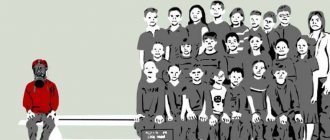Rationalization is a way of explaining the reaction mechanisms of the external and internal world from a rationally determined position, developed during a collision with psycho-emotional overloads. The most relevant moments are situations where there is no conscious component, when the situation is of an unconscious or uncontrollable nature. Refers to a defense mechanism caused by thinking using only part of the information perceived from reality, and adjusting the result of the analysis so that behavior acts as a controlled act that corresponds to reality.
Rationalization is a defense mechanism that attempts to explain incomprehensible or unacceptable behavior that is not explained by consciousness, or to justify a misdemeanor or mistake, in an effort to maintain self-esteem and positive self-perception. The emergence of this type of defense correlates with the accentuation of obsessive and individualistic personality traits. Nevertheless, being the most common form of protection against frustration, in terms of numerical indicators of occurrence, rationalization was used by everyone, occurring in a mild or in-depth form. The basic desire for predictability of emotional and effective reactions, for the stability of the surrounding system, as well as the importance of social desirability, determines the emergence of rationalization as the most socially acceptable and evolutionarily relevant way of protecting the psyche.
What is rationalization
Rationalization in psychology is a defense mechanism in which a person seeks a logical explanation for actions, behavior, thoughts and feelings, thus protecting his self-esteem and self-esteem from the effects of negative emotions. We can say that rationalization is an unconscious attempt to justify something that contradicts public opinion. That is, the individual wants to explain his actions, which are unacceptable to society, with arguments and arguments that this society will accept. It turns out that he kills two birds with one stone: both people are happy and self-esteem remains at the proper level.
An interesting explanation of the term is given in the Oxford Dictionary. According to him, rationalization is the process of giving clarity and rationality to strange and incomprehensible actions. It comes in handy when there is a need to hide real motives and feelings from others.
If we say what rationalization is in simple words, the definition will look like this: this is the search for motives that explain an undesirable pattern of human behavior and help him maintain a state of comfort and internal harmony.
Let's give an example. The person did not consider it necessary to help a close relative in a critical situation. He justifies his action by saying that his help would not have brought the desired result, but, on the contrary, would have only made things worse. There is another example. The alcoholic justifies his addiction by saying that the doctor recommended drinking small doses of alcohol to treat his illness.
The way a person will justify himself is chosen unconsciously. The real reasons for self-justification are just as unconscious. An individual simply chooses those words that will present him to society in a favorable light and help maintain respect in his own eyes.
Sometimes it happens that after the acquittal process is over, a person thinks about his behavior. And he understands that some of his reasoning and words are only partly true. But he finds an excuse for this too, because lowering his self-esteem was not part of his plans. The main task at this moment is to fully comply with the ideal invented by yourself.
Unconscious rationalization cannot be called deception, but it is considered the most dangerous psychological defense mechanism. This is despite the fact that in most cases the person's words are generally true. The danger is that life becomes too predictable, because every step and every action is always justified and justified.
Notes
- Nancy McWilliams, “Psychoanalytic Diagnostics: Understanding Personality Structure in the Clinical Process,” chapter “Rationalization,” ed. "Class", 1998.
- Nancy McWilliams, “Psychoanalytic Diagnostics: Understanding Personality Structure in the Clinical Process,” chapter “Obsessive and Compulsive Personalities,” ed. "Class", 1998.
Rationalism is not reinventing the wheel, it's just common sense
the meaning and method of making the right decisions.
Dmitry Solo. Principles of Rationalism. Start
“I thought Karpov wasn’t afraid of anything.” - You know the difference between fear,
explain rationality and stupidity?
TV series "Capercaillie"
Rationality as a personality quality is a tendency to have an overly rational attitude towards life; the ability to direct one’s actions towards the most reasonable, expedient use of something.
Two woodcutters once argued which of them would cut more wood from the morning until four o’clock in the afternoon. In the morning the men dispersed to their positions. At first they worked at the same pace. But an hour later, one of them heard the second stop cutting down the tree. Realizing that this was his chance, the first lumberjack redoubled his efforts. Ten minutes passed and he heard the second woodcutter get to work again. And again they worked almost in sync, when suddenly the first woodcutter again heard his opponent stop again. Once again the woodcutter happily set to work, already feeling the smell of victory. And this went on all day. Every hour one of the loggers stopped for ten minutes, and the second continued working. When the time was up, the one who worked without ceasing was absolutely sure that the prize was in his pocket. Imagine his surprise when he learned that he was mistaken. - How did it happen? - he asked his partner. “Every hour I heard you stop working for ten minutes.” How did you manage to chop more wood than me? This is impossible! “It’s actually very simple,” he answered directly. — Every hour I stopped for ten minutes. And while you continued to cut down the forest, I sharpened my ax.
A rational person strives to find the optimal solution that leads to the goal in the most reliable way. To do this, he weighs, calculates, justifies, compares, in a word, does everything possible to solve the problem “headlong”, rationally, with the mandate received from reason, clear logic and expediency.
Rationality as a quality of personality manifests itself when the consent of the mind is obtained, because its functions include analyzing incoming information, comparing it with existing knowledge, applying it to one’s life experience, building logical structures, and justifying one’s decisions with considerations of efficiency and expediency. Rationality can be either leisurely, judicious, or impetuous, decisive, ready to take risks in conditions of uncertainty.
Take bankers, for example. Who will say that they do not work rationally? Operating in an unstable environment and not having complete information about counterparties, commercial banks are forced to thoughtfully manage banking risks in their daily activities through proven methods and techniques. “You can’t do business without taking risks,” says Richard Boulton and his colleagues. “If you don’t take risks, you won’t earn anything.” Professor V.V. Vitlinsky is right about.
Rationality is a masculine personality quality. A man has a highly developed mind, a woman has a highly developed mind. A woman’s mind on a subtle level is located next to her feelings, while a man’s mind is located at a distance from the feelings. Therefore, women by nature are more emotional, sensitive and unbalanced. They are more prone to irrationality. Unconditional, selfless love is also irrational.
The male mind, like the female one, is called upon to control insatiable feelings and a restless, chaotic mind. This requires self-control and self-discipline. Anyone who knows how to control his feelings and mind cannot, by definition, be irrational. He who is colonized by whimsical, capricious feelings, who is curbed by a lustful, chaotic mind, who is under the cap of a false ego, undoubtedly has a frail, weak-willed mind. Only a muscular mind ensures the rationality of an individual’s behavior. When the mind is undermined and broken by an orgy of feelings, a riot of mind and the eccentricity of a false ego, it is absurd to talk about any kind of rationality in human behavior.
Women, due to danger or necessity, can also show rationality and prudence, for example, at work, but as soon as they find themselves in a familiar environment, they return to what is more characteristic of them: being emotional, impulsive and sensitive. That is, when it is necessary to protect their husband or children, their interests, women can show remarkable will, rationality of action and prudence. Pierre-Augustin Beaumarchais spoke wonderfully about this: “Nature said to a woman: be beautiful if you can, wise if you want, but you must certainly be prudent.”
Rationality goes hand in hand with a sense of proportion. Dmitry Solo writes: “There should be a little bit of good, just take a woman’s breasts, they can be different, but imagine if someone is smart enough to increase them to size 7-12 or more... Or imagine that among us there will be giant people walking around - 3-5 meters in height, and some will reach the size of skyscrapers... It will be strange, won’t it?”
Why is rationality needed? R. Hastie and R. Davis write: “From a practical point of view, so that a person can achieve more in life. And more not only in terms of money, but also quality of life, relationships with other people, self-development and other things. Moreover, the use of rational decision making will provide a sequence of ways to achieve multiple goals with minimal effort.”
Rationality, in order to avoid conflicts, must always carry out a comprehensive analysis of the realities of life before making a decision.
Workers were called into the garden to repair the porch. They always had to bend over because of an apple tree branch that hung low over the path leading to the porch. One of the workers decided to take care of the elderly owners, who apparently did not have the strength to cut down this branch. When the next morning the owners saw the cut down branch, they were terribly upset. After all, out of the entire old apple orchard, only this branch was bearing fruit.
Varieties and methods
Rationalization, considered as a psychological defense mechanism, comes in two types:
- direct - the individual justifies his own actions, thoughts and feelings;
- indirect—external objects are involved in justification.
Also in psychology there are several subtypes of this process:
- Personal or group rationalization. In the first case, the individual protects exclusively himself. In the second - a group of people with which he associates himself.
- Current rationalization. Valid for a short period of time.
- Anticipatory rationalization. The unpleasant situation has not yet occurred, and the person already begins to look for excuses for his actions in advance.
Rationalization as a method of psychological defense is characterized by the use of different methods. There are 6 of them in total:
- Depreciation of the goal. The loss in the competition is explained by bad prizes, which it would be foolish to strive for.
- Discrediting the victim. Let's say a person offended someone. In his defense, he will say that the opponent himself is to blame and in a similar situation would have acted in exactly the same way.
- Strengthening the role of circumstances. When rationalizing, circumstances are always used to justify what happened.
- Harm for good. Many people sincerely believe in the rightness of their actions towards others. They explain them with the words: “it will be better for them,” “I tried for their own good.”
- Discrediting oneself. A person makes himself a victim. He demonstratively agrees that he did a bad thing and talks about how bad it makes him. Who would argue with such a sufferer?
- Self-deception.
Each of the listed methods of rationalization causes certain harm to the human personality.
Understanding the Worldview
Becoming a rational person is not so easy. You need to work hard for this. The result largely depends on the individual’s acceptance of the worldview of this category of people. The signs of a rational person are not height, weight or temperament type. It is also important to understand that this is not a cult - a rationalist, for example, can be a teacher, a miner, a businessman, or even a janitor who reads works on biology at night. These people do not seek recognition; their true Grail is the understanding of all things, infinite knowledge, the characteristics of all objects. It is extremely difficult to learn this; in addition, the process involves abandoning previously accepted truths. A rational person is one who questions everything, including his own knowledge.
See what “Rationalization (psychology)” is in other dictionaries:
- Rationalization - (lat. rationalis reasonable) bringing something to a rational, reasonable form. Rationalization (philosophy) is a change in the method of cognition to rationalism. Rationalization of production, search for more optimal ways... ... Wikipedia
- labor psychology is a science that studies the psychological patterns of the formation of specific forms of labor activity and a person’s attitude to work. From the perspective of P. t., an individual’s working and free time are closely interconnected, as well as working and reproduction conditions... ... Great psychological encyclopedia
- Labor psychology - Labor psychology is a branch of psychology that examines the psychological characteristics of human labor activity and the patterns of development of labor skills. There is an opinion that the description of this science should be divided into broad and narrow... ... Wikipedia
- Labor psychology is a field of psychology that studies the patterns of manifestation and formation of various psychological mechanisms in work. The following main areas of research are highlighted: rationalization of work and rest, dynamics of performance, formation ... ... Psychological Dictionary
- PSYCHOLOGY is the science of mental reality, of how an individual experiences, perceives, feels, thinks and acts. For a deeper understanding of the human psyche, psychologists study the mental regulation of animal behavior and the functioning of such... ... Collier's Encyclopedia
- Labor psychology is a branch of psychology that studies the psychological aspects of work activity. * * * branch of psychological science that studies the characteristics and patterns of various types of work activity and a person’s relationship to work, the activity of an individual in ... ... Encyclopedic Dictionary of Psychology and Pedagogy
- Projection (psychology) - This term has other meanings, see Projection. Projection (lat. projectio throwing forward) is a psychological process attributed to the mechanisms of psychological defense, as a result of which the internal is mistakenly perceived as ... ... Wikipedia
- Transference (psychology) - Articles on the topic Psychoanalysis Concepts Metapsychology Psychosexual development Psychosocial development Consciousness • Preconscious Unconscious Mental apparatus It • Self • Superego Libido • Repression Dream analysis Defense mechanism Transference • ... Wikipedia
- Identification (psychology) - This term has other meanings, see Identification. This article is about a relatively passive defense mechanism. For a defense mechanism that includes unconscious manipulation, see Projective identification.... ... Wikipedia
- Regression (psychology) - This term has other meanings, see Regression. Regression (lat. Regressus reverse movement) is a protective mechanism, which is a form of psychological adaptation in a situation of conflict or anxiety, when a person unconsciously ... ... Wikipedia
> Relationship with personality types
It is believed that rationalization is especially characteristic of obsessive individuals.
Rationalization is also characteristic of sociopaths.
> See also
- Selective presentation of facts
- Nancy McWilliams, “Psychoanalytic Diagnostics: Understanding Personality Structure in the Clinical Process,” chapter “Rationalization,” ed. "Class", 1998.
- Nancy McWilliams, “Psychoanalytic Diagnostics: Understanding Personality Structure in the Clinical Process,” chapter “Obsessive and Compulsive Personalities,” ed. "Class", 1998.
At-risk groups
Rationalization as a way to protect the psyche from unwanted emotions is quite popular. Many people use it. But most often those who really need psychological help. There are 2 categories at risk:
- Obsessive personalities. They doubt everything. And it doesn’t matter what it is - the person himself, his abilities, the people around him, his work, etc. All the doubts they have over time become obsessive thoughts.
- Sociopaths. It is difficult for such people to build adequate relationships with society, as well as accept generally accepted rules and norms. They often show aggression and impulsiveness.
Rationalization is dangerous in any case, regardless of whether the person is at risk or not.
see also
- Anangeon (or dikeology)
- Confirming the investigation
- Circumstantial evidence
- Cognitive inertia
- Compartmentalization (psychology)
- Offset confirmation
- Criminals out of guilt
- Negation
- Displacement (psychology)
- Doublethink
- Explanation
- Phantom Supremacy
- Intellectualization
- The phenomenon of a just world
- Minimization (psychology)
- Motivated Reasoning
- Omission bias
- Psychological projection
- Psychological suppression
- Rationality
- Formation reaction
- Regression (psychology)
- Self-deception
- Spin (public relations)
- Splitting (psychology)
- Blaming the victim
Consequences
Sometimes it seems that rationalization has nothing wrong with it, because, let’s say, it helps to “save face” and get out of any situation with honor. However, everything is much more complicated. This method will not solve the problem. A person only disguises it and tries to protect himself from it. He tries to show that he is better than he really is, and this only complicates the situation.
Plus, with rationalization, labeling, simplification, and the construction of incorrect patterns of behavior occur. Again and again, a person acts according to pre-prepared patterns. As a result, his life becomes boring and gray. It is difficult to surprise an individual with anything. Yes, he doesn’t want this, because he loses interest in reality.
Pros and cons of rationalization
Like any other method of psychological defense, rationalization has its advantages and disadvantages. Benefits include:
- Maintaining self-confidence.
- Elimination of anxiety, overstrain.
- Maintaining the required level of self-esteem and self-respect.
- Endowing the surrounding world with validity and predictability.
- The ability to justify absolutely all your actions and not strive for change.
Among the shortcomings of rationalization, the following points stand out:
- As stated above, the problem still remains unresolved. It still exists and requires a solution.
- Due to attempts to appear better than others, personal growth slows down or stops altogether.
- Thinking is subject to patterns. Over and over again, a person acts according to the same patterns. He knows in advance what he will say and how he will behave in a given situation.
- A person loses faith in something impossible, because in his head there is an explanation and justification for everything.
Frequent use of rationalization over time leads to the development of neuroses and various mental disorders, as well as increased internal conflicts.
How to find and work through rationalization
A rational person tends to quickly analyze and evaluate various situations. From the outside it seems that even in the most complex of them he does not need time to think; he makes a decision in a matter of seconds. He always knows why circumstances turned out this way and not differently.
There are several ways to reduce the impact of rationalization:
- Think about how quickly you can analyze a situation.
- Pay attention to the connections you make between events.
- Allow yourself to at least sometimes fully feel and experience emotions. And it doesn’t matter what they will be - positive or negative.
- You should not label or explain the behavior of people around you. Just watch.
- Don't try to evaluate a situation immediately after it happens. Don't give advice.
- Give up the habit of systematization and templates.
And the most important rule in the fight against rationalization is to perceive every situation, emotion or feeling as something interesting, something that does not correspond to any patterns or stereotypes. Only in this case will life also be interesting.
Principles of rationalism
The movement is largely formed thanks to certain cornerstones laid by its researchers and founders. In the case of rationalism, such a foundation is its principles:
- Knowledge is obtained by reason. Any information or skill must be comprehended by the human mind. In fact, knowledge is a product of the study of a particular object by the thought of an individual. It's priceless. It is knowledge that is the main value of supporters of rationalism.
- The world is material. Rationalists believe that the entire world around us is material and suitable for knowledge. Objects distant from humanity are only things hidden from thought, but they can be recognized by using new knowledge. Thus the cycle of knowledge is closed. Therefore, some people call rationalism an endless race for knowledge for the sake of information itself, and not for a higher goal.
- Science comes first. Everything in this world can be identified and studied using scientific instruments. Rationalists put science as the only possible way to understand ourselves and the world.
- The “spiritual” does not exist without the material. In this case, spirituality means, for example, a sense of beauty or good taste. They are a product of human mental perception, which, in turn, is based on the thought process, the mind, which is material in nature.
- Morality is a product of the material, since it is designed to prohibit and prevent damage to an object capable of generating thought.
Rational people are often disciplined and rely heavily on their reason. You should not expect support from them in spiritualism or occultism; a supporter of this movement simply will not understand the speaker. However, as mentioned earlier, rationalists are open to new knowledge.
Examples from life
Imagine a girl who lives in a small apartment in a residential area. She works in the center. Every day it takes 2 hours to get to work. This girl’s dream is to buy an apartment in the center. But for many years now she has not been able to save the required amount of money. And at some point she begins to look for excuses for the current circumstances. First, he convinces himself that the new apartment will probably have to be renovated, which will take a lot of effort, time and money. In addition, although the apartment will be in the center, it is far from the metro. Consequently, getting to work will be inconvenient.
Criticism
Some scientists criticize the idea that the brain is designed to rationalize irrational decisions, arguing that evolution will not waste more nutrients on mental processes that do not improve decisions, such as rationalizing decisions that would have been made anyway. These scientists argue that learning from mistakes would be reduced rather than enhanced by rationalization, and criticize the hypothesis that rationalization evolved as a means of social manipulation, noting that if rational arguments were deceptive, there would be no evolutionary chance for breeding individuals , which would respond to arguments and therefore render them ineffective and unable to be selected by evolution.











